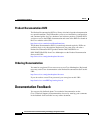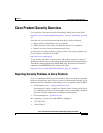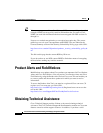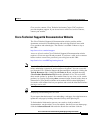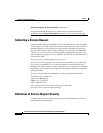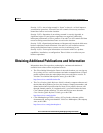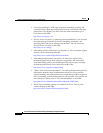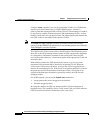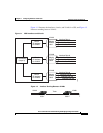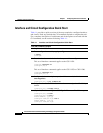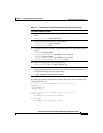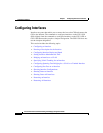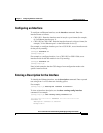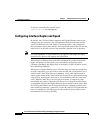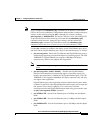
Chapter 1 Configuring Interfaces and Circuits
Interface and Circuit Overview
1-2
Cisco Content Services Switch Routing and Bridging Configuration Guide
OL-8241-02
Using the trunk command, you can assign multiple VLANs to a CSS Ethernet
interface port (Fast Ethernet port or Gigabit Ethernet port). A trunk is a
point-to-point link carrying the traffic of several VLANs. The advantage of a trunk is
to save ports by creating a link between two CSSs implementing VLANs. A trunk
bundles virtual links over one physical link. The unique physical link between the
two CSSs is able to carry traffic for the specified VLANs.
Note The trunk and vlan commands (and the associated software functionality)
comply with the IEEE 802.1Q Standard for Local and Metropolitan Area Networks:
Virtual Bridged Local Area Networks.
The CSS forwards VLAN circuit traffic to the IP interface. The IP interface passes
the traffic to the IP forwarding function where the CSS compares the destination
of each packet to information contained in the routing table. Once the CSS
resolves the packet addresses, it forwards the packet to the appropriate VLAN and
destination port.
With trunking enabled, the CSS automatically inserts a tag in every frame
transmitted over the trunk link to identify the originating VLAN. When the
VLAN-aware CSS receives the frame, it reviews the VLAN-tagged packet to
identify the transmitting VLAN. If the VLAN is recognized, the frame is routed to
the proper port and VLAN destination. If the frame is from a VLAN that is not
assigned to the trunk port, the packet is ignored. By default, the CSS discards
untagged packets.
For an 802.1Q trunk, you can use the default-vlan command to:
• Accept packets that arrive untagged on the interface
• Transmit untagged packets
By using this method, the CSS can determine which VLAN transmitted an
untagged frame. This capability allows VLAN-aware CSSs and VLAN-unaware
CSSs to transmit and receive information on the same cable.



